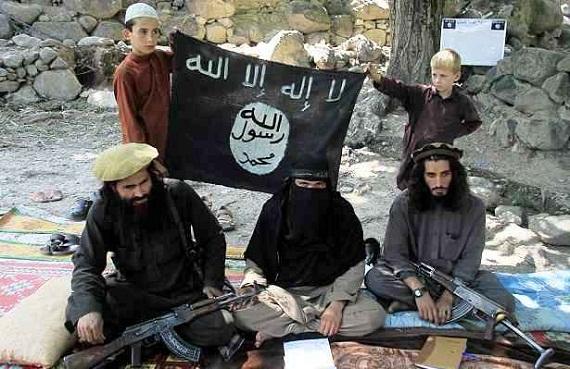HEADLINE
ISIS establishing foothold in Afghanistan
"Earlier this month seven Hazaras, including women and children were beheaded after they were kidnapped by ISIS militants. "
Ghayor Waziri

After claiming responsibility for a string of attacks, analysts say ISIS, or the Islamic State of Iraq and Syria, is developing a foothold in Afghanistan.
The development is especially concerning to the ethnic Hazara minority.
Earlier this month seven Hazaras, including women and children were beheaded after they were kidnapped by ISIS militants.
Ghayor Waziri has this report on the activities of ISIS in the country.
It’s been only 18 months since the terrorist group ISIS took control of one of Iraq’s largest cities and declared an Islamic caliphate.
Since then foreign fighters from around the world have flocked to join the conflict.
ISIS leader Abu Bakr al-Baghdadi has also inspired pledges of allegiance from militant groups in the Middle East, as well as groups like Boko Haram, from Nigeria.
Now, it seems ISIS-allied fighters are also gaining a foothold in Afghanistan.
Terrorism expert Salem Wahdat explains.
“ISIS, or Daesh, has two goals in Afghanistan, first having a public base after Syria in the region, and their second aim is to recruit Afghans for expanding their fight to central Asia,” he says. ISIS in Afghanistan is no different from ISIS in Iraq and Syria but for now they are confined to remote and mountainous areas.”
Thirty-year-old Hazara student Khalil Aseer is very concerned about the emergence of ISIS in Afghanistan.
Hazaras are a persecuted minority, often attacked by the Taliban.
But recently ISIS has claimed responsibility for attacks against the Hazaras, including the brutal beheading that occurred earlier this month.
“There was eight kidnappings in Ghazni and Zabul provinces, and for 7 of these ISIS was responsible. The last kidnapping was about two weeks ago, when ISIS kidnapped 7 Hazaras, including women, in Zabul province and beheaded them,” he says, “I think that by kidnapping the Hazaras, ISIS is trying to marginalize religious and ethnic factions.”
After the beheading of 7 Hazaras, tens of thousands of Afghans demonstrated in the streets of Kabul, chanting “Death to the Islamic State”.
They also demanded the government take action against the killings.
Fatima Nabawee, joined the protest.
“Our demand is safety and security for our people, that we shall have the right to live in freedom, far from any risk and insecurity, as freedom is every resident’s right,” says Nabawee.
The ideology of ISIS is Salafist, which as analyst Salem explains, is a very austere interpretation of Islam.
But while ISIS is believed to be establishing a foothold in Afghanistan, Salem believes the group is unlikely to gain significant traction.
“Recent information and research about ISIS supporters in different countries shows that support for ISIS in Afghanistan is low,” says Salem, “In the past attempts to fuel religious fights have largely been unsuccessful. ISIS is trying to promote religious divisions and fights in the region, in Afghanistan, Pakistan, Iraq and Syria.”
The Afghan government believes ISIS has been most active in Nangerhar province, a remote area in eastern Afghanistan. Some ex-Taliban members are thought to have joined.
Afghanistan’s national intelligence chief Rahmatullah Nabil’s told a press conference this week that Pakistani extremists are also involved.
“When last year Pakistan started a huge operation against terrorist groups in the tribal areas, different kinds of terrorist groups entered Afghanistan with their families,” he says, “Most of the terrorists who are fighting against Afghan forces in Nangerhar province, about 70% of them are from Pakistan tribal areas.”
The presence of ISIS in Afghanistan has also angered Taliban militants, who claim they are solely responsible for jihad in the country.
This month Taliban members also claimed they killed several ISIS supporters.
Sidiq Sidiqee, spokesperson for the interior ministry, explains how the government has responded to ISIS.
“Our combat strategy against ISIS, which was recently approved by the Afghan government, has over the last three months seen hundreds of ISIS members arrested and killed in Nangerhar, Helmand and Farah provinces,” says Sidiqee.
Since the multiple attacks in Paris, the Afghan government has stepped up it strategy, but now, by fighting two hardline groups, the Taliban and ISIS, there is a huge challenge ahead.
- eng
- Ghayor Waziri
- ISIS Afghanistan
- Hazara Afghanistan
Komentar (0)
KBR percaya pembaca situs ini adalah orang-orang yang cerdas dan terpelajar. Karena itu mari kita gunakan kata-kata yang santun di dalam kolom komentar ini. Kalimat yang sopan, menjauhi prasangka SARA (suku, agama, ras dan antargolongan), pasti akan lebih didengar. Yuk, kita praktikkan!